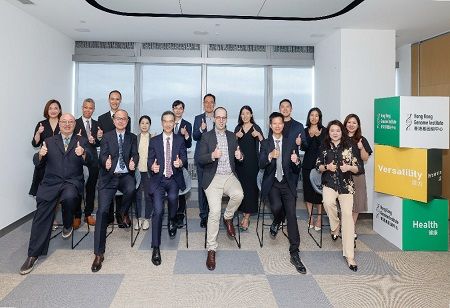The Hong Kong Genome Institute (HKGI) recently hosted a meeting with global biopharmaceutical leader AstraZeneca (AZ) to explore advancements in genomic medicine and therapeutic research. Emphasizing their commitment to patient welfare, both organizations expressed a desire to investigate collaborative research opportunities aimed at accelerating clinical trials for new drugs and therapies. This partnership is anticipated to drive medical innovation and enhance healthcare services in the region, ultimately benefiting the wider community.
The meeting was chaired by Dr. Lo Su-vui, CEO of HKGI, and included a delegation from AZ, led by Dr. Slavé Petrovski, Vice President of the Centre for Genomics Research; Dr. Lifeng Tian, Director and Head of the Centre for Genomics Research in China; and Dr. Xiaoxiao Qian, Senior Director of Strategy for R&D in China. Representatives from the Health Bureau and the Office for Attracting Strategic Enterprises of the HKSAR Government also attended.
During the meeting, Dr. Brian Chung, HKGI’s Chief Medical and Scientific Officer, shared insights into the Hong Kong Genome Project (HKGP), the territory's first large-scale whole genome sequencing initiative. The project has successfully enrolled nearly 40,000 participants, forming a genome database primarily composed of the Southern Chinese population. Dr. Chung highlighted several ongoing genetics and multi-omics studies at HKGI, including pharmacogenomics and metabolomics research, which are pivotal in understanding disease mechanisms and developing precision therapies.
Dr. Petrovski articulated AZ's vision for advancing genomic medicine, focusing on large-scale omics research. Dr. Tian discussed AZ's research priorities in Hong Kong, emphasizing their commitment to enhancing drug discovery through advanced data science and their interest in strategic partnerships with HKGI to propel multi-omics studies forward. The AZ team also toured HKGI’s genomic laboratory, which features a comprehensive whole genome sequencing pipeline, from sample collection to report generation.
Dr. Lo Su-vui remarked, "We are excited to collaborate with the AZ team on this professional level. Clinical trials are essential for realizing the promise of genomic medicine, and high-quality data is crucial to their success. After over three years of dedicated work, we are building a genome database that not only focuses on the Southern Chinese population but also integrates clinical data, covering over 20 genetic disorders and common diseases".
To maximize the database's potential, HKGI has developed the Synergistic Research Environment (SRE). Once de-identified and encrypted, data within the genome database can be accessed by approved researchers and institutions, promoting innovation and expediting clinical trials for new therapeutics, leading to quicker, more precise drug development.
Dr. Lo added, "Currently, international human genome databases are predominantly European-based, with Asian population data representing only about 10%. This lack of diversity presents significant challenges for diagnosis and treatment. Our database aims to address this gap, enabling the development of more targeted diagnostic and treatment solutions for the wider community."
Dr. Tian of AZ expressed gratitude for the opportunity to engage with HKGI, commending the institute's operational standards and laboratory workflow, which meet international benchmarks. He emphasized the value of HKGI's genome database for supporting local clinical trials, positioning it as a unique research asset for the industry.
This meeting marks a significant step toward fostering ongoing dialogue and potential collaborations between HKGI and AZ in the fields of genomic and pharmaceutical research. In alignment with the HKSAR Government's initiatives to establish the Greater Bay Area International Clinical Trial Institute, HKGI is committed to engaging with various stakeholders to explore collaboration opportunities that will advance genomic medicine and benefit the public, reinforcing Hong Kong’s status as a hub for health and medical innovation.

